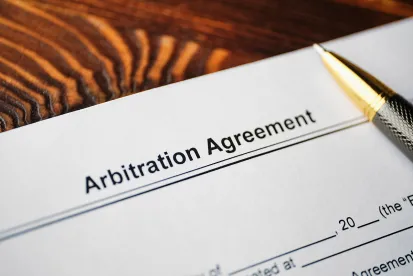The Federal Circuit’s recent ruling in MaxPower Semiconductor Inc. et al v. Rohm Semiconductor USA, LLC highlights the interplay between the liberal federal policy favoring arbitration agreements and the Patent Trial and Appeal Board’s (“PTAB”) authority as an agency tribunal having a broad role to protect the public interest in ensuring the quality of patents.
Challenging the validity of a patent through the inter partes review (IPR) process at the PTAB is a conventional alternative to litigating invalidity in federal court. MaxPower addressed the question of whether the PTAB will defer to an agreement to arbitrate that did not expressly preclude the parties from proceeding before the PTAB.
In MaxPower, MaxPower agreed to license silicon transistor semiconductors patents to Rohm in 2007. The license included an arbitration provision, which provided: “[a]ny dispute, controversy, or claim arising out of or in relation to this Agreement or at law, or the breach, termination, or invalidity thereof, that cannot be settled amicably by agreement of the parties hereto, shall be solely and finally settled by arbitration [in Santa Clara County, California, USA] in accordance with the provisions of the California Code of Civil Procedure.”
Rohm paid MaxPower royalties until 2015, when it announced that its new silicon carbide transistors did not use MaxPower’s patents and were not covered by the license. The parties could not resolve the dispute and MaxPower notified Rohm that it would initiate an arbitration. Rohm then filed petitions for IPR of MaxPower’s patents as well as a district court action seeking a declaratory judgement of non-infringement. In response, MaxPower filed a petition to compel arbitration. The district court granted MaxPower’s petition and the court dismissed the case without prejudice. In contrast, the PTAB panel declined to accept MaxPower’s arguments that Rohm should be held to its agreement to arbitrate under the Federal Arbitration Act and instituted inter partes review of MaxPower’s patents. Notably, the panel concluded: “[W]e … do not find a statute, rule, or policy that would preclude the Office from acting on the Petition.” MaxPower filed an interlocutory appeal after institution (but before a final written decision) and alternatively sought mandamus relief.
The Federal Circuit did not rule on whether the PTAB should be bound by arbitration clauses, but instead ruled on whether MaxPower’s appeal and mandamus petition were proper. In dismissing MaxPower’s appeals, the majority first explained that the PTAB’s institution decisions are nonappealable under 35 U.S.C. § 314(d), and that mandamus relief could not be used as a “means of avoiding the statutory prohibition on appellate review of agency institution decisions.” The majority also found that MaxPower has not shown that it is entitled to review under the collateral order doctrine. Finally, the majority found that the PTAB’s decisions do not fall in any of the categories specified by 9 U.S.C. § 16(a)(1), which authorizes appeals in certain cases, such as cases brought in U.S. courts. As a result, the IPR could proceed despite the arbitration provision in the parties’ license agreement. The dissenting opinion disagreed with the majority’s denial of MaxPower’s writ of mandamus because it “allows the Patent Trial and Appeal Board to add a new caveat to Congress’s clear instruction that agreements to arbitrate patent validity shall be ‘valid, irrevocable, and enforceable’—i.e., except during inter partes review.”
Some commentators have noted that this decision highlights the PTAB’s role beyond serving as an alternative adjudicative body for patent validity litigation, namely protecting the public against suspect patents. This role is arguably supported in the permissive standing requirement for inter partes review, whereby “a person who is not the owner of a patent” may file an IPR petition. It is also consistent with the legislative history of the AIA to address the questionable quality of issued patents. Given the competing Congressional intent favoring arbitration agreements and also directing the PTAB to ensure the quality of patents, whether parties to license agreements can avoid the result in MaxPower may ultimately turn on the precise wording of the agreement and whether it specifically prohibits parties from filing IPR petitions.




 />i
/>i

